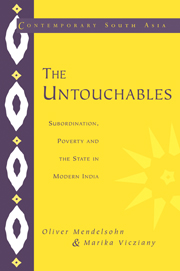Book contents
- Frontmatter
- Contents
- List of tables
- Glossary
- Preface
- 1 Who are the Untouchables?
- 2 The question of the ‘Harijan atrocity’
- 3 Religion, politics and the Untouchables from the nineteenth century to 1956
- 4 Public policy I: adverse discrimination and compensatory discrimination
- 5 Public policy II: the anti-poverty programs
- 6 The new Untouchable proletariat: a case study of the Faridabad stone quarries
- 7 Untouchable politics and Untouchable politicians since 1956
- 8 The question of reservation: the lives and careers of some Scheduled Caste MPs and MLAs
- 9 Subordination, poverty and the state in modern India
- Bibliography
- Index
3 - Religion, politics and the Untouchables from the nineteenth century to 1956
Published online by Cambridge University Press: 05 June 2012
- Frontmatter
- Contents
- List of tables
- Glossary
- Preface
- 1 Who are the Untouchables?
- 2 The question of the ‘Harijan atrocity’
- 3 Religion, politics and the Untouchables from the nineteenth century to 1956
- 4 Public policy I: adverse discrimination and compensatory discrimination
- 5 Public policy II: the anti-poverty programs
- 6 The new Untouchable proletariat: a case study of the Faridabad stone quarries
- 7 Untouchable politics and Untouchable politicians since 1956
- 8 The question of reservation: the lives and careers of some Scheduled Caste MPs and MLAs
- 9 Subordination, poverty and the state in modern India
- Bibliography
- Index
Summary
We have argued that the basis of much of the contemporary violence surrounding Untouchables is a conscious resistance to oppression. Consciousness of oppression may well be as old as the system of Untouchability itself, but the conditions for its development into militancy were put in place only during the period of direct British rule after the uprising of 1857. The present chapter sets out to explore this period, particularly the crucial quarter-century before Independence. This was the period dominated by Gandhi and Ambedkar. The narrative is a tangled skein of religion and politics: both Gandhi and Ambedkar ultimately committed themselves to an essentially religious solution to the task of attacking Untouchability. Gandhi was broadly consistent in his attitudes to the Untouchable question throughout his political life, though his commitment and tactics varied. The Untouchability of what Gandhi came to call ‘Harijans’ or ‘People of God’ was for him an historical corruption of Hinduism. It would be cured by caste Hindus purging themselves of the immorality that had insinuated itself into the pure body of Hinduism. Untouchables would join their fellow Hindus in a reborn equality.
Ambedkar, on the other hand, moved through several distinct phases in his thinking. One of his first campaigns in the late 1920s was an effort to force Hindu temples in Maharashtra to open their doors to Untouchables. But by the time Gandhi endorsed this strategy in the 1930s, Ambedkar had abandoned it. By then Ambedkar saw Hinduism as irredeemable, as having an essential and not merely an historical association with dehumanising discrimination.
- Type
- Chapter
- Information
- The UntouchablesSubordination, Poverty and the State in Modern India, pp. 77 - 117Publisher: Cambridge University PressPrint publication year: 1998



